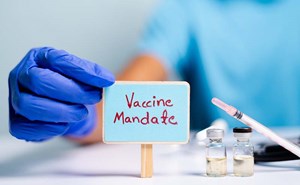I’m sure many of you, like me, follow Dr. Glaucomflecken on Twitter. Dr. Glaucomflecken is an ophthalmologist and comedian who posts hilarious, but extremely poignant, short videos (featuring himself) about important health care topics on Twitter. If you do follow him, you have likely seen his interview with the U.S. Surgeon General, Dr. Vivek Murthy, last December about the strain that the COVID-19 pandemic is putting on clinicians and how that is leading to significant burnout. During the interview, Dr. Murthy made a “personal” appeal (on behalf of the federal government) to all health care workers on the frontlines, saying that “we see you, we appreciate you, and we have your back.”
When I saw this video, I wanted to know more about what the U.S. Department of Health and Human Services (HHS) was in fact doing to support frontline clinicians during this extremely difficult time. ACEP has been engaged in numerous initiatives around physician wellness, and I thought it would be useful to “compare notes” with HHS and try to coordinate our efforts. I reached out to the Office of the Assistant Secretary of Health (OASH) at HHS—which houses the Office of the Surgeon General— and was able to arrange a meeting that occurred last week.
ACEP met with senior HHS/OASH staff during the meeting, including an emergency physician, Dr. Garth Walker, who is a White House Fellow within the Office of the Surgeon General. We had an in-depth discussion on physician wellness, where we voiced our concerns regarding the compounding problems of long wait times, staffing shortages, boarding issues, violence in the emergency department (ED), and physician burnout and exhaustion.
HHS/OASH did seem committed to addressing this issue—as Dr. Murthy made clear in his interview with Dr. Glaucomflecken—and stated that they are working on putting out resources to help clinicians. However, they didn’t have any ready-made solutions to the major systemic problems highlighted above that are leading to burnout and fatigue, especially staffing shortages and ED boarding.
As alluded to earlier, we also had the opportunity during the meeting to inform HHS about all of our initiatives and advocacy efforts around physician wellness. It’s been a while since I have shared that information with you, so I thought I’d also touch upon the highlights here.
First of all, it is important to know that ACEP has a website dedicated to wellness, where we have created a repository of wellness resources, including the ACEP Wellness & Assistance Program and the ACEP Wellness Guide. The ACEP Wellness & Assistance Program is a valuable ACEP member benefit, offering ACEP members exclusive access to three free counseling or wellness sessions.
We are also proud to be a steadfast partner of The Lorna Breen Heroes Foundation, established to advocate for the well-being of health care workers and remove barriers that discourage clinicians from seeking mental health services. Named after Dr. Lorna Breen, an emergency physician who tragically died by suicide in 2020, the Foundation started working with us early last year to promote the Dr. Lorna Breen Health Care Provider Protection Act—which is now in the final stages of being enacted by Congress and we hope will be signed into law in the very near future.
This critical piece of legislation:
- Establishes grants for training health profession students, residents, or health care professionals in evidence-informed strategies to reduce and prevent suicide, burnout, mental health conditions, and substance use disorders.
- Seeks to identify and disseminate evidence-informed best practices for reducing and preventing suicide and burnout among health care professionals.
- Establishes a national evidence-based education and awareness campaign targeting health care professionals to encourage them to seek support and treatment.
- Establishes grants for employee education, peer-support programming, and mental and behavioral health treatment, with priority to eligible entities in health professional shortage areas or rural areas.
- Commissions a federal study into health care professional mental health and burnout and barriers to seeking appropriate care, including examination of COVID-19’s impact.
The passage of this Act has been one of ACEP’s top priorities and was a key issue discussed during ACEP’s Leadership and Advocacy Conference last year. During the conference, 324 ACEP members conducted 287 congressional meetings with lawmakers from 44 states. While the Act has not been signed into law yet, we were able to secure $140 million in funding for the bill as part of the American Rescue Plan that was passed last March. The Health Resources and Services Administration (HRSA) within HHS recently announced that it had awarded $103 million of that funding in grants to reduce burnout and promote mental health and wellness among health care workers.
With the full passage of the Dr. Lorna Breen Health Care Provider Protection Act hopefully imminent and funding for the Act already appropriated and allocated, we have continued to partner with The Lorna Breen Heroes Foundation in other ways. Late last year, the Foundation launched a new interactive community and fund in support of health care workers’ well-being called “ALL IN: Wellbeing First for Healthcare.” The ALL IN website serves as a hub of mental health and resiliency resources, providing tools for implementation and a platform to share and engage with other perspectives and commentary from frontline health care workers, institutional leaders, and the public. ACEP was proud to be an inaugural partner in the ALL IN Initiative, and we encourage you to check out and interact with the ALL IN website. Share your story and download some useful resources!
Our ongoing work with The Lorna Breen Heroes Foundation builds off our previous efforts to address the many challenges that physicians face receiving the mental health care they need. In a Summer 2020 survey that ACEP circulated to members, 45 percent of emergency physicians reported not feeling comfortable seeking mental health treatment and 57 percent of emergency physicians reported feeling concerned for their job if they were to seek mental health treatment. While we have taken some actions to address this significant issue, such as issuing a joint statement with over 40 leading medical organizations that outlines recommendations for removing these existing barriers, much more work is needed.
Similarly, as noted in previous Regs and Eggs blogs, ACEP has also done work to try to tackle some of the root causes of burden and stress, such as ED boarding and ED violence. For example, we met with the head of the Medicare program at the Centers for Medicare & Medicaid Services (CMS) last October to talk about potential short and long-term solutions to help address the ED boarding crisis. We discussed potential tools to help mitigate boarding, such as increased CMS flexibilities and waivers, standards for prompt transfer out of the ED once a disposition decision by the treating emergency physician has been made, the development of a real-time bed tracking dashboard, and the ability to use alternative placement or home support for Medicare patients to help open beds. With respect to ED violence, ACEP contributed to the development of new The Joint Commission (TJC) workplace violence prevention requirements that became effective at the beginning of this year. In addition, ACEP is expected to have a representative on a panel that will help guide the development of a new Occupational Health and Safety Administration (OSHA) workplace violence standard.
Despite the steps ACEP has already taken, we definitely know that we have much more work to do! Please feel free to reach out to us with additional advocacy actions you think we can take to help you. As HHS/OASH noted during our meeting, we need better solutions to the major issues you as emergency physicians are facing that are contributing to burnout and mental anguish. The status quo is truly unacceptable and unsustainable!
Until next week, this is Jeffrey saying, enjoy reading regs with your eggs!






